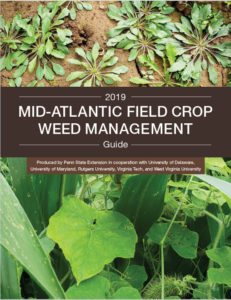 The 2019 updated version of the “Mid-Atlantic Field Crop Weed Management Guide” is available. This guide is collaboratively developed by weed scientists from Penn State, , Univ. of Delaware, Univ. of Maryland, Rutgers University, Virginia Tech, and West Virginia Univ.
The 2019 updated version of the “Mid-Atlantic Field Crop Weed Management Guide” is available. This guide is collaboratively developed by weed scientists from Penn State, , Univ. of Delaware, Univ. of Maryland, Rutgers University, Virginia Tech, and West Virginia Univ.
The guide covers weed management for field corn, sorghum, soybean, small grains, and forage and pastures. Information concerning the use, restrictions, and recommendations of burndown, preemergence, and postemergence herbicides labeled on these crops can be found in the guide, including relative effectiveness data from locally conducted research. Description of the various premixes as well as guidance for managing troublesome weeds are also part of the guide.
The guide can be ordered on-line at https://extension.psu.edu/mid-atlantic-field-crop-weed-management-guide. Available on-line are the printed copies for $25; an enhanced pdf copy for use on computers and tablets for $15 or both a hard copy and pdf for $35.
A sample of the guide can be downloaded at the following address https://extension.psu.edu/downloadable/download/sample/sample_id/880/

